- Home
- David Gemmell
Winter Warriors Page 7
Winter Warriors Read online
Page 7
Three men followed him at a discreet distance.
As Nogusta had predicted Dagorian won his way through to the final of the sabres, and there met Antikas Karios. The Ventrian was faster in the strike than any man Nogusta had ever seen, his blade a shimmering blur. Three times in swift succession he pierced Dagorian's defences, lightly touching his sabre to the padded chest guard. The contest was short, and embarrassingly one sided.
With the contest over Dagorian waited courteously while Antikas Karios received the Silver Sabre then faded back into the crowd. Nogusta tapped him on the shoulder. 'You fought well,' said the black man. 'Your arm is swift, your eye good, but your narrow stance let you down. Your feet were too close together. When he attacked you were off balance.'
'Even so he is the most formidable swordsman I have ever seen,' said Dagorian.
'He is deadly,' agreed Nogusta.
'Do you think you could have beaten him?'
'Not even at my best.'
Dusk was closing in and the crowd began to mill at the meadow. Kalizkan strode out alone to the centre of the field. As the sky darkened he raised his slender arms. Bright light shone from his fingers, spraying up into the air in vivid parallel flashes. The crowd applauded. In the sky the lights became a sea of stars, flowing together to form a male face, crowned with horns. This was the Bat-god, Anharat. Other divine faces glowed into view, gods and goddesses from Ventrian mythology. The faces spun in the air, creating a colossal circle of light that filled the sky. Lastly a white horse and rider could be seen, galloping between the stars. It came closer and closer. The rider was a handsome man, his armour glowing, his sword held high. He rode to the centre of the circle of gods, and reared his horse. Then he pulled off his helm, and the crowd roared to see it was Skanda. The king of kings to whom even the gods showed obeisance. Applause rang out. The image shimmered for several seconds, then the eldritch stars broke up once more, flowing over the heads of the crowd, and lighting the way to the three exit gates.
The carriages of the nobles had been drawn up outside the pavilion. The king and Malikada rode together, Skanda waving to the people as the carriage made its slow way to the gates. Then the crowd was allowed to leave. Nogusta bade farewell to the young Drenai and wandered away.
Night fell upon the meadow, and workmen moved in to dismantle the tents and the pavilion.
A lone wagon pulled up outside the tent of Kalizkan, and four men climbed from it. Furtively they glanced around, to be sure they were not overlooked. Then they entered the tent, and removed the blood-drenched bodies of six young children.
Nogusta was troubled as he made his way through the city streets. The crowd was thinning now, many stopping at ale houses and taverns, or moving through to the lantern lit night markets and the whores who plied their trade there. Nogusta was uneasy - and it was not the three men following who made him so. He had become aware of them earlier in the day. No, it was the talisman he wore. Sometimes a year could pass without a vision. Yet today he had experienced three, bright, vivid scenes. The first he had outlined to Dagorian. The second he had withheld, for it showed the young man fallen and bleeding upon a bridge of stone. But the third was altogether more mysterious; he was facing someone wearing black armour. His enemy was not human, and when their swords clashed lightning leapt up from the blades. And there was something else. The shadow of huge wings descending towards him. Nogusta shivered. He had experienced the vision during Kalizkan's magical display, and wondered if somehow the sorcery had affected the talisman, causing a false vision. He hoped so.
He glanced up into the night sky and shivered. The last of the winter could be felt now that the sun had gone down, and the temperature was barely above freezing. Lifting his head he scented the night, the city smells, hot food, spicy and rich, smoke from wood fires, the musty human scents left by the crowd. The last vision had left him on edge. It was like the night before a battle, when the air is charged with tension.
Pausing in the Lantern Market he stopped at a stall and examined the wares, glazed pottery and necklaces of jade. He glanced back the way he had come. Two of the assassins were engaged in conversation. The third he could not see. Swiftly he scanned the crowd. Then he saw him, some way ahead, in a shadowed doorway.
Nogusta had no wish to kill these men. They were merely obeying the orders of their commander. But it would not be easy to evade them. A woman approached him. She was young and blonde, her face and lips painted. He smiled at her and she took his arm, leading him into an alley. A narrow flight of stairs led to a small room and a grimy bed. Nogusta paid her, then opened the window and stared down. The three assassins were waiting in the shadows.
'Is there another way out of here?' Nogusta asked the girl.
'Yes.' She pointed to a curtain. 'Through there, along the corridor, and down into the back streets. Why?'
Thank you,' he said, opening his pouch and tossing her a silver coin. He was about to leave when she opened her dress and lay back on the bed, moonlight gleaming from her full breasts, her ivory belly and her pale thighs. Nogusta chuckled. Let them wait in the cold, he thought.
And moved to the girl.
An hour later he slipped through the curtain, along the corridor and out into the night.
The feeling of unease was still strong upon him, and he had long ago learned to trust his instincts. He smiled as he remembered the lion. It had been a night like this, cold and bright. He had awoken, nostrils flaring, aware of danger. Armed with only a knife the fourteen-year-old Nogusta had slipped from his room and out into the night. His father's horses had been uneasy, and they stood in a tight group, watching warily. The lion had burst from the undergrowth, and leapt the paddock fence. In one movement Nogusta had hurled his knife. It slammed into the lion's side. With a startled roar it turned on the boy. Nogusta had sprinted towards the barn, knowing the lion would catch him. But then Palarin, the lord of the herd, a huge black stallion of seventeen hands charged the lion, rearing up and lashing out with his hooves. The sudden attack made the lion swerve, but then he continued after the boy. Nogusta made it to the barn, grabbed a pitchfork, and turned just in time. The lion leapt, impaling itself on the twin blades. In its dying rage it lashed out, snapping the pitchfork and slashing Nogusta's chest, breaking three ribs.
He smiled at the memory. Never as good with horses as his brothers he had, for a time at least, been the hero who saved the herd. It was a good memory. Palarin had sired many fine warhorses, and from his line came the king's great war mount, Starfire.
Yet, like me, even he is getting old now, thought Nogusta, with a sigh. And he had been missing from the afternoon races. The rumour was that Starfire was ill. Nogusta decided to seek out the horse tomorrow, and see what treatment had been recommended.
He moved off into the back streets, enjoyed a meal at a small tavern, then headed for the barracks. He had no doubt the men, having lost him, would be waiting there. How he would handle the situation would depend entirely on their skill. If they were clumsy he would disable them, but if they were skilful he would have to kill them. This thought was not a happy one. In truth Nogusta had seen enough killing in his life, and wanted nothing more than to return to the high mountains and find the descendants of the herd. It would, he thought, at least make some sense of the remainder of his life. His thoughts turned to Skanda. The man was brave and adored by his troops. He was charismatic and intelligent. Yet there was something missing in him, some cold empty place untouched by human warmth. Despite this Nogusta liked him. Who could not? The man was capable of immense generosity. Yet equally he could be suddenly vain and jealous, and act with incredible malice. Perhaps all kings are this way, thought Nogusta. Perhaps it is the nature of powerful men.
The sky was clear, the moon and stars bright as he made his way through the back streets. The smell of freshly baked bread from the barracks kitchens wafted to him on the breeze, and he slowed his walk. Some thirty paces ahead the street intersected the Avenue of Light. Across the av
enue, past the statues of the emperors was the old barracks building. Nogusta halted. Three men, armed with knives or short swords, were waiting somewhere ahead. Three men he had never met, who had been ordered to kill him. He did not hate them. They were merely soldiers obeying orders.
Yet neither was he prepared to die. Taking a deep breath he strode out onto the Avenue of Light. Lanterns were placed on tall poles along both sides of the Avenue, the bronze statues of the emperors gleaming like gold.
Nogusta moved out into the open and walked across the broad paved road. As he skirted the statue of the ancient king, Gorben, two men sprinted from the shadows. Both carried knives. Nogusta let them come. As the fastest man approached him Nogusta spun to one side, then launched a kick into the man's kneecap. The strike was not perfect, but the assassin was hurled from his feet. Nogusta ignored him and leapt to meet the second man, knocking aside the knife arm and hammering a right hook to the man's chin. He too spun to the ground, but rolled to his feet immediately. The first man was sitting in the road, unable to stand on his twisted knee. But he hurled his knife. Nogusta swayed aside from the blade, which flashed harmlessly by to clatter against the base of Gorben's statue. The second assassin attacked again, this time more warily. Nogusta stood very still, encouraging the man to move in close. He did so with a sudden rush. Nogusta grabbed his wrist and dragged him into a savage head butt which smashed the man's nose. He groaned and sagged against the black warrior. Nogusta spun him then slammed the edge of his palm against the assassin's neck. The man fell without a sound. The third man had not shown himself.
Nogusta walked on. The barracks gate was only thirty paces ahead now. Nogusta glanced back. The Ventrian with the injured knee had hobbled to his comrade and was sitting beside him. The black man moved into the shadow of the gate arch. A whisper of movement! Nogusta dived forward just as a knife sliced the air above him. The assassin was fast and leapt upon Nogusta before he could rise. Nogusta's elbow slammed back into the man's ribs, bringing a grunt of pain. The black man swivelled and sent a straight left into the Ventrian's face. The man lashed out, his fist cracking against Nogusta's cheek. Nogusta's head thumped against the stone walkway. Bright stars exploded before his eyes and Nogusta felt a wave of dizziness threatening to engulf him. For a while the two men grappled, and the older warrior felt his strength draining away. The assassin drew a second knife. With the last of his strength Nogusta hit him in the throat with stiffened fingers. The man gagged and reared up. Nogusta grabbed him by his shirt and threw him to one side. Rolling to his feet the black warrior kicked the assassin under the chin, catapulting him backwards. He moved in for a second strike, but his opponent was unconscious.
Breathless and exhausted Nogusta slumped to a bench seat under the arch. It would have been less effort to kill them all, he thought.
Hooded and cloaked against the night winds Ulmenetha walked slowly up the winding path towards the white marble temple that crowned the hill. She was tired, her calves burning as she reached the open gates. There was a time, back in Drenan, when she would have run this hill for the sheer pleasure of it. In the days of her youth she had been slim and fast, and physical exertion had been a joy that lifted her spirits. Not now. Now it was a chore to drag her overweight frame up such an incline. Panting she sat herself down on the steps of the temple entrance and waited for her hammering heart to slow down.
A young priest in white robes walked by her, bowing as he passed.
Heaving herself to her feet she entered the building, curtsying towards the High Altar. Dipping her finger into a stone bowl full of holy water she traced a circle upon her brow then walked to the back of the temple, seating herself in an alcove beneath a wreath of elegantly carved vines.
Another priest, a tall, balding young man with a prominent nose and a weak chin, saw her there and approached. 'What do you seek, mother?' he asked her. 'The Oracle Voice is not present.'
'I need no Voice,' she told him.
'Then why are you here at this late hour?' He was wearing the grey robes of a Senior Brother and his blue eyes looked world-weary and bored.
'Are you a Seer?' she asked him.
'Sadly, no, mother. I am still a student in such matters. But I have hopes that one day the curtain will part for me. What encouragement do you seek?'
'I seek a place without demons,' she told him. Instantly his face changed, and he made the sign of the Protective Horn.
'Such a word should not be used here,' he admonished her, his voice less friendly.
She smiled. 'If not here, then where? Never mind,' she added, seeing his confusion. 'Is there one among your order who is a Seer?'
'There was one,' he told her. 'Father Aminias. But he died last week. We were all saddened, for he was a fine man.'
'Was he ill?'
'No. He was attacked while out on his pastoral duties. A madman, it seems. He was screeching at the top of his voice, and he stabbed poor Aminias many times before he was dragged away.'
'And there is no-one else?'
'No, mother. Such Gifts are becoming increasingly rare, I think.'
'And yet they are ever more important,' she said, pushing herself to her feet.
'You spoke of . . . unholy beings. Why was that?' His blue eyes were suddenly fearful. Ulmenetha shook her head.
'You do not have the power to help me,' she said.
'Even so, mother, I would be grateful if you would enlighten me.'
Ulmenetha was silent for a moment. She looked at the grey robed priest. Her first impression had been of a weak man, but as she looked more closely she felt she might have mistaken sensitivity for weakness. And she desperately needed someone to confide in. Ulmenetha took a deep breath, and sat down once more. 'Someone is summoning demons,' she said, at last. 'They are everywhere, and growing in number. I have the eyes to see them, but not the wit to discern their purpose.' The balding priest sat down beside her.
'Father Aminias said the same thing,' he told her. 'It was his belief that a great spell was being wrought. But I cannot see these . . . these creatures. And I know not how to combat them. Nor even if I should try.' He gave a wan smile. 'Who are you, mother?'
'I am the Priestess Ulmenetha, the companion of Axiana the queen.'
'And what did you hope to achieve here?'
'I sought answers. I have had three visions, and can make no sense of any of them.' She told him of the four warriors and the white crow, of the demon in the lake, and of the sacrifice of the emperor. He listened in silence.
'I have never been blessed with your Gift,' he said, 'but what I have been given is the Gift of Discernment. Your visions are true ones. This I know. You saw three scenes. Three is a number of great power among mystics, and your experience is not unique. What you saw is called a kiraz. The first scene concerns the cause of the problem. The second illuminates how the problem will manifest itself. The third is more complex. It always reveals the protagonists, but also often reveals a clue to the solution of the problem. Now let us examine them in detail. The Demon of the Lake - the cause - is more of a symbolic vision. It came out of the ice, you say. If I read it correctly the lake is a symbol for a gateway between its world and ours. You say it flowed like smoke into the body of a man. This is a man being possessed. But more than that it is a man being possessed after having been slain. What we have is a demon inhabiting a corpse. This demon must therefore be a most powerful creature. He now dwells in the world of men. He it is who has summoned the creatures you see over the city. It is his purpose that must be discerned.
'As to the emperor being sacrificed . . . this is not a symbol. There were many rumours when he was slain, and the body was never recovered. But the voice you heard was interesting. "The day of Resurrection is at hand. You are the first of the Three." Once again we have the number three. But what is to be resurrected? And who are the other two? This is the manifestation of the problem. Three are to be sacrificed in order for the Demon to achieve his purpose. One is already slain.
'Now to the scene in the forest. You and the queen stand protected by a few soldiers. Three old men and a youngster are all that stand between you and a terrible evil. The clue here, I believe is the person you are protecting. Axiana is obviously one of the Three. It makes sense, since her father was the first. Perhaps there is something in the bloodline that the Demon requires.' He smiled and spread his hands. 'I can tell you no more, Ulmenetha.'
'Should I try to find these soldiers?'
He shook his head. 'What you saw is what will be, whether you seek them out or not.'
'You did not mention the white crow,' she pointed out.
'No,' he said, sadly. 'Nor did I need to. You know what that means.'
'Aye, I know,' she said, wearily. She gazed around the temple, unwilling to leave its quiet sanctuary. On the wall above the High Altar was carved the symbol of Emsharas, the slender hand holding a crescent moon. 'I thought this to be a Source temple,' she said. 'It is unusual to find the crescent moon in such a place.'
'You perceive Emsharas to be a creature of evil?'
'Was he not, according to legend, a demon?' she asked.
'He was indeed one of the Windborn, a spirit being. The name "demon" is a description devised by man. We have here in this temple many of the oldest scrolls in existence, and even some legends engraved on gold foil. I have studied them over the years. I have come to admire Emsharas, and I believe he was Source driven. Did your studies include the legends of the Demon Wars?'
'Very briefly,' she told him. 'Thousands of years ago Emsharas and his brother, Anharat, were enemies. Emsharas joined the human armies of the Three Kings, and banished all demons from the world. That is the sum total of my knowledge.'
'In truth that is probably the sum total of all our knowledge,' he said. 'But you notice the figure three appearing again? It is of great mystical significance. However, he did not merely banish demons from the world. All the creatures of the Windborn vanished as a result of the Great Spell.'

 Bloodstone
Bloodstone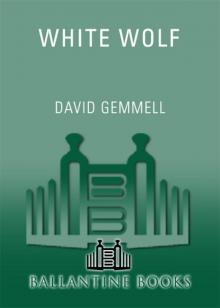 White Wolf
White Wolf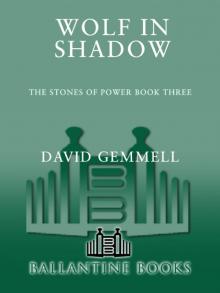 Wolf in Shadow
Wolf in Shadow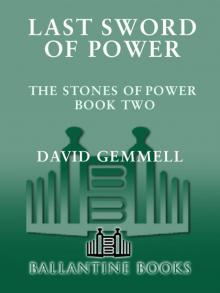 Last Sword of Power
Last Sword of Power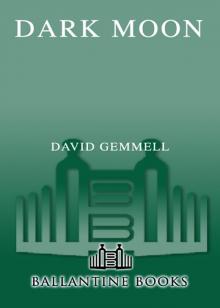 Dark Moon
Dark Moon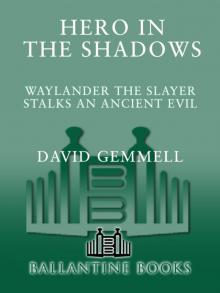 Hero in the Shadows
Hero in the Shadows Gemmell, David - Drenai 09 - Hero In The Shadows
Gemmell, David - Drenai 09 - Hero In The Shadows Waylander
Waylander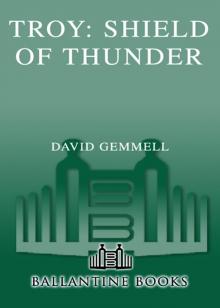 Shield of Thunder
Shield of Thunder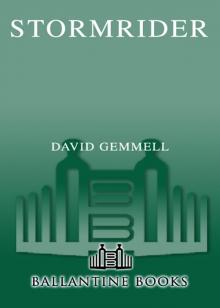 Stormrider Stormrider
Stormrider Stormrider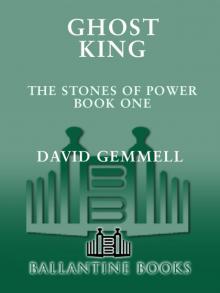 Ghost King
Ghost King Legend
Legend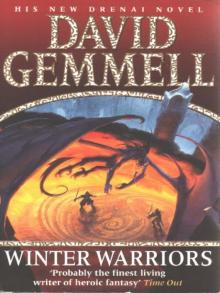 Winter Warriors
Winter Warriors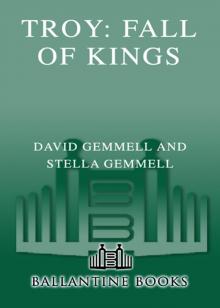 Fall of Kings
Fall of Kings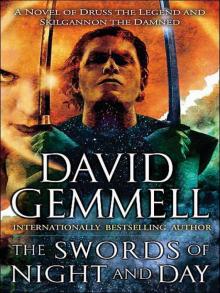 The Swords of Night and Day
The Swords of Night and Day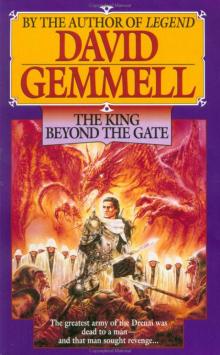 The King Beyond the Gate
The King Beyond the Gate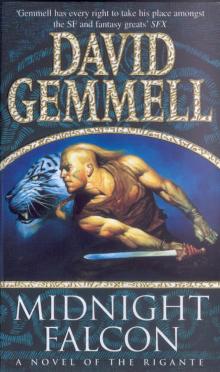 Midnight Falcon
Midnight Falcon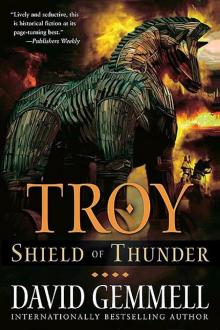 02 - Shield of Thunder
02 - Shield of Thunder In the Realm of the Wolf
In the Realm of the Wolf Ravenheart
Ravenheart The First Chronicles of Druss the Legend
The First Chronicles of Druss the Legend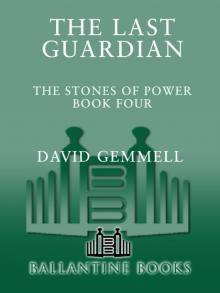 Last Guardian
Last Guardian Stormrider
Stormrider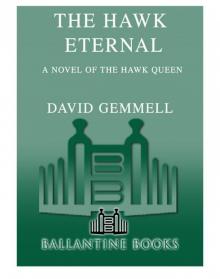 The Hawk Eternal
The Hawk Eternal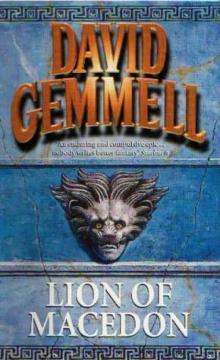 Lion of Macedon
Lion of Macedon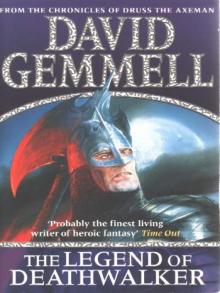 The Legend of Deathwalker
The Legend of Deathwalker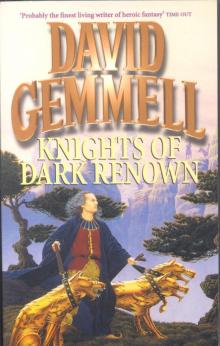 Knights of Dark Renown
Knights of Dark Renown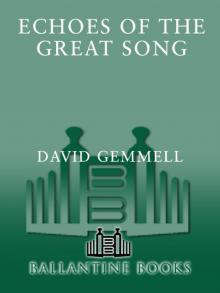 Echoes of the Great Song
Echoes of the Great Song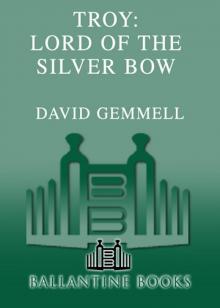 Lord of the Silver Bow
Lord of the Silver Bow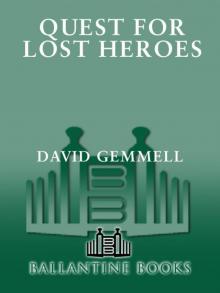 Quest for Lost Heroes
Quest for Lost Heroes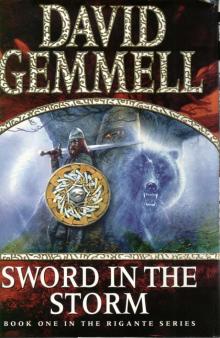 Sword in the Storm
Sword in the Storm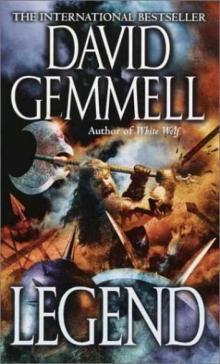 Drenai Saga 01 - Legend
Drenai Saga 01 - Legend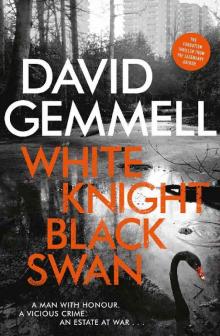 White Knight/Black Swan
White Knight/Black Swan![[Troy 02] - Shield of Thunder Read online](http://i1.bookreadfree.com/i/03/19/troy_02_-_shield_of_thunder_preview.jpg) [Troy 02] - Shield of Thunder
[Troy 02] - Shield of Thunder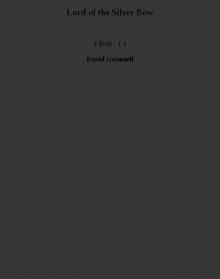 Lord of the Silver Bow t-1
Lord of the Silver Bow t-1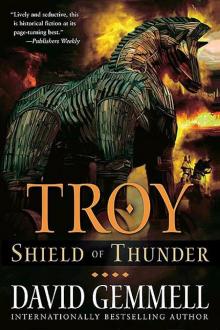 Shield of Thunder t-2
Shield of Thunder t-2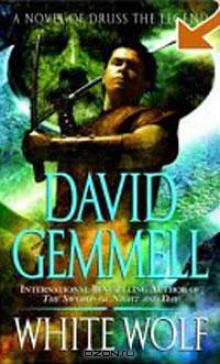 White Wolf: A Novel of Druss the Legend dt-10
White Wolf: A Novel of Druss the Legend dt-10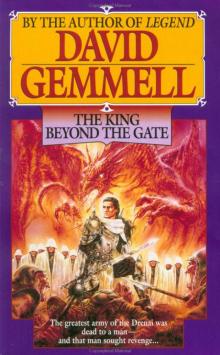 Drenai Saga 02 - The King Beyond the Gate
Drenai Saga 02 - The King Beyond the Gate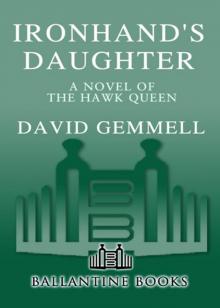 Ironhand's Daughter
Ironhand's Daughter Gemmell, David - Drenai 06 - The First Chronicles of Druss the Legend
Gemmell, David - Drenai 06 - The First Chronicles of Druss the Legend The Last Guardian
The Last Guardian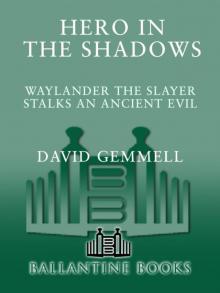 Hero in the Shadows: A Waylander the Slayer Novel
Hero in the Shadows: A Waylander the Slayer Novel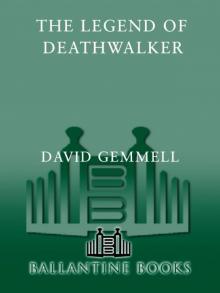 The Legend of the Deathwalker
The Legend of the Deathwalker